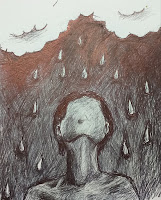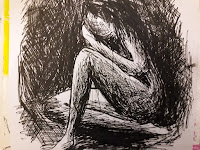Linda shares how drawing has helped her in her eating disorder recovery
- Linda
Starting University was supposed to be a daunting experience, especially as I was spreading my wings and moving away from home for the first time. However, I integrated into University surprisingly well. I made friends quickly and easily and thrived in my degree. I was happy.
Soon enough, things started to fall apart. I started dieting and exercising a lot more than usual. I just wanted to be healthy, but slowly, my relationship with food was becoming more disordered. It was a very slippery slope; by the end of the second term of university, I had lost a lot of weight and hadn’t eaten a proper meal in ages. My whole life revolved around food. I sat in lectures, unable to concentrate because I was starving. I spent ages coming up with excuses to avoid social commitments that involved food. Shopping became laborious. I went to Tesco’s every day; I was so scared of binge eating that I only bought enough food for two meals at a time. When I went, I spent ages trying to find the ‘right’ food. When I returned home, cooking would feel like an immense struggle.
Bulimia became my self-identity. I was engaged less in my hobbies and degree. My hallmates were not entirely sure what was happening to me, because my eating disorder was my secret shame. Despite this, my hallmates showered me with their love and support. My birthday was in May and my hallmates, knowing that I enjoyed drawing, gave me a sketchbook. They decorated the front and back cover with drawings. I stroked my beautiful book and flicked through its empty pages. It was so full of potential. I owed it to my hallmates to at least use the notebook for something. Initially, I drew sporadically, but I lacked the passion, energy and time. After a while, I stopped.
During my third year, I started group therapy. It was a compassion-based cognitive behaviour therapy. My clinical psychologists encouraged my group to replace our maladaptive coping mechanisms with more positive ones. However, I was furious at them. They were telling me to replace my disorder behaviours as if it were a choice. I did not choose bulimia; I wouldn’t even wish bulimia on my worst enemy!
Not discouraged, my psychologists encouraged me to dig deep below my eating disorder. Soon, I realised that having bulimia was merely a plaster on a wound. The real issue was deep-rooted and complicated and instead of tackling it head-on, I focused on food and told the world that I was JUST FINE. Quite clearly, I was not fine. I was so overwhelmed by these emotions. I relied more on my eating disorder, self-harmed and withdrew from the world, but with my new-found awareness, none of these behaviours were as comforting as I used to be.
I started to draw again. I tried to channel all the anger, pain and sadness into my drawing. This time, drawing did not feel as effortful and uninteresting. When I drew, it felt like a release. It was amazing, looking back at my art and thinking wow, if I can create something so beautiful from my experience, then there is hope somewhere out there.
I was discharged by my eating disorder clinic five months ago. I am not ‘cured’ – I still have a long way to go, but I am getting there. Now, I draw a couple of times a week to express my emotions. In doing so, I have come to realise that I am not defined by my eating disorder.
Hello, my name is Linda. I am studying a MSc in Psychological research at the University of Warwick. I found out about Student Minds when I was doing my dissertation. I was impressed by their efforts to try and improve University experience and was eager to get involved.






No comments:
Post a Comment